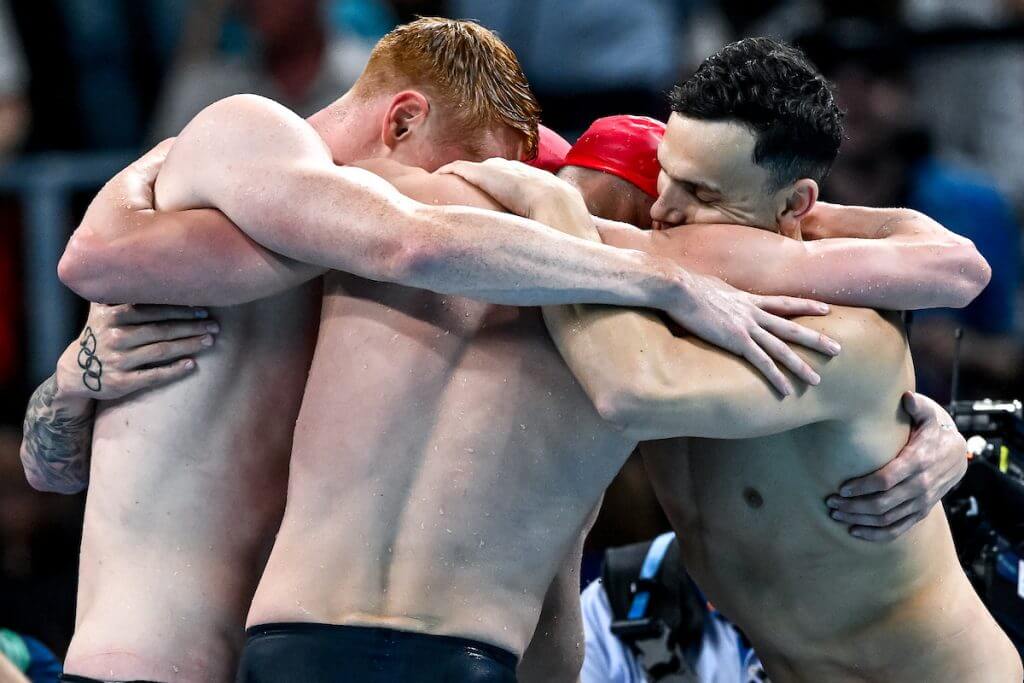Success of British 800 Freestyle Relay Can Be Connected to Camaraderie and Brotherhood

Success of British 800 Freestyle Relay Can Be Connected to Camaraderie and Brotherhood
No four individuals had combined to win relay gold medals at two different Olympics.
The United States’ men’s 800 freestyle relay came close when Michael Phelps, Ryan Lochte and Peter Vanderkaay, who were three members of the winning quartet at Athens 2004, returned four years later in Beijing. However, Ricky Berens replaced Klete Keller (who’d raced the decider in Athens) in the final after the latter handled the anchor leg in prelims.
But that statistic has now been consigned to history after James Guy, Tom Dean, Matt Richards and Duncan Scott claimed 800 freestyle relay gold for Great Britain in Paris, three years after they triumphed in Tokyo to claim a third straight medal in the event, a run that started with silver at Rio 2016.
Guy led off in 1:45.09 followed by Dean (1:45.28) and Richards (1:45.11) before Scott anchored them home in 1:43.95, the only sub-1:44 of the field.
The evolution of the quartet can be traced to the 2015 World Championships in Kazan. Before then, Great Britain had won two medals in the event at Worlds, with silver at Cali 1975 and bronze at Perth 1998.
Guy had already won the individual event in Kazan when he came from third at the 150-meter mark behind Lochte and Sun Yang to take the title in 1:45.14. The quartet of Robbie Renwick, Nick Grainger, Daniel Wallace and Scott had qualified third from the prelims behind Australia and the USA.
Come the final and Grainger made way for Calum Jarvis with Guy replacing Scott on anchor.
Scott – who was 18 at the time – looked back at Kazan, telling Swimming World: “2015 was really special for me. My first World Champs and the way the team did it. I just did the heat, but it was a huge part of my journey because it was disappointment at not being part of a final team but also the realization of how good this team is and what it could be the following year in 2016 and with its leader in Jimmy.”
Stephen Milne joined up with Scott, Wallace and Guy to win Olympic silver at Rio 2016 and a year later, GB defended its world title thanks to Milne, Grainger, Scott and Guy – with an anchor leg of 1:43.80 – in Budapest.
It was in 2018 that Dean got onboard, swimming the penultimate leg as Great Britain won the European title in Glasgow. They finished fifth at the 2019 World Champs – 0.06 off the podium – with the 2020 calendar pretty much wiped out by Covid-19.
There was a new face on the team at the European Championships in May 2021 as 18-year-old Richards joined Dean, Guy and Scott with the quartet claiming silver behind Russia in Budapest.
That effort was followed a couple of months later by the Olympic title where they went within 0.03 of the USA’s 2009 world record in 6:58.58 for a European standard.
Shorn of Scott through Covid and with Richards experiencing a dip in performance, the British squad won bronze at the 2022 Worlds before the quartet reunited and won gold a year later in Fukuoka.
Then came the Olympic title once more in Paris.
Richards is the youngest at 21 with Dean, 24, and Scott, 27. At 28, Guy is the oldest, but he has been galvanized under the tutelage of Ryan Livingstone since moving to Millfield in September of last year. He set a personal best of 1:45.04 while leading off prelims in Paris, nine years after his previous best en route to the individual title in Kazan.
Livingstone is set to take up the role of Aquatics GB Manchester Performance Centre Lead Coach with Guy returning to his roots in the English northwest and Richards apparently set to do the same following his wedding to fellow swimmer Emily Large.
The quartet is set to stay together for some time, with Richards telling Swimming World about the importance of camaraderie among the four.
“I think that definitely means there’s that sense of ease when you’re in the call room together, when you’re in the prep space together, when you’re warming up together, you know each other so well,” he said. “We know what we all need and that means we can help each other get the best out of ourselves to come together as a quartet.
“Just being able to read somebody’s thoughts and emotions just by having a little look at them in the call room and know whether or not you need to have a chat with them or just leave them to listen to music or whatever it might be. I think that just helps with that sense of ease when you go to races, and you know what each other needs.”

- EVENT PAGE
- SCHEDULE
- VENUE
- STREAMING INFO
- DAY 1 PRELIMS RESULTS
- DAY 1 FINALS RESULTS
- DAY 2 PRELIMS RESULTS
- DAY 2 FINALS RESULTS
- DAY 3 PRELIMS RESULTS
- DAY 3 FINALS RESULTS
- DAY 4 PRELIMS RESULTS
- DAY 4 FINALS RESULTS
- DAY 5 PRELIMS RESULTS
- DAY 5 FINALS RESULTS
- DAY 6 PRELIMS RESULTS
- DAY 6 FINALS RESULTS
- DAY 7 PRELIMS RESULTS
- DAY 7 FINALS RESULTS
- DAY 8 PRELIMS RESULTS
- DAY 8 FINALS RESULTS
- DAY 9 FINALS RESULTS



